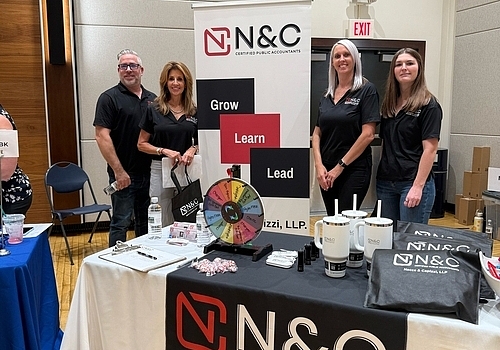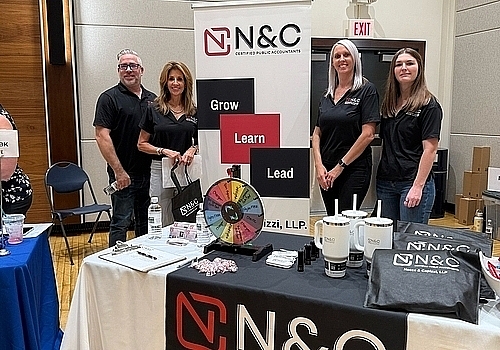Resources
How Non-Profits Can Strengthen Donor Trust with Better Accounting Practices

Non-profit organizations play an essential role in the Rochester community, from providing healthcare and education to supporting arts, culture, and social services. But no matter how inspiring a mission may be, a non-profit cannot thrive without one critical ingredient: donor trust. Contributors want assurance that their donations are being managed responsibly and making a real difference. One of the most effective ways to build and maintain this trust is through strong, transparent accounting practices.
At Nacca & Capizzi, LLP, we’ve supported Rochester non-profits since 1979, providing specialized accounting, tax, and advisory services. Here’s how non-profits can strengthen donor trust by improving their financial management and reporting systems.
1. Implement Transparent Financial Reporting
Transparency is the cornerstone of donor confidence. Non-profits that provide clear, accurate financial statements reassure contributors that their funds are being used as intended. This includes producing annual reports, making Form 990 filings accessible, and sharing summaries of how donations are allocated.
When non-profits openly communicate their financial health, it eliminates uncertainty and demonstrates accountability. This transparency also makes organizations more attractive to grant-making institutions and corporate sponsors who require financial clarity before investing in a cause.
2. Maintain Strong Fund Accounting Systems
Unlike traditional businesses, non-profits must practice fund accounting, which tracks revenue and expenses based on restrictions and donor intent. For example, if a donor specifies that funds be used for scholarships, the organization must demonstrate that those dollars are not redirected elsewhere.
By maintaining precise fund accounting systems, non-profits not only comply with IRS requirements but also give donors peace of mind. This level of detail shows that contributions are respected and used responsibly, building long-term loyalty and repeat giving.
3. Adopt Internal Controls to Prevent Mismanagement
Unfortunately, non-profits can be vulnerable to fraud or financial mismanagement, particularly when resources are limited. Establishing internal controls—such as separating financial duties, requiring dual approvals for payments, and scheduling regular audits—protects both the organization and its donors.
When donors see that an organization has strong safeguards in place, it reinforces confidence that their contributions are secure. It also demonstrates professionalism, which can set one non-profit apart from another competing for the same funding.
4. Embrace Technology for Better Accuracy
Donors expect modern organizations to manage finances efficiently. Outdated spreadsheets and manual processes leave too much room for error. By adopting accounting software like QuickBooks for Non-Profits, organizations can automate transactions, track restricted funds, and generate reports tailored for board members and funders.
As QuickBooks ProAdvisors, Nacca & Capizzi helps non-profits in Rochester implement these tools effectively, ensuring accuracy while saving valuable time. Better technology not only improves financial management but also signals to donors that the organization operates with professionalism and efficiency.
5. Provide Regular Donor Impact Reports
Beyond the numbers, donors want to see the tangible impact of their contributions. Providing periodic reports that connect financial data to program outcomes is a powerful way to build trust. For example, instead of simply stating that $50,000 was spent on community programs, explain that the funds provided meals for 2,000 families or funded scholarships for 15 students.
Linking dollars to outcomes demonstrates accountability and helps donors feel connected to the mission. When people see their contributions making a measurable difference, they’re more likely to give again.
6. Stay Compliant with IRS and State Requirements
Non-profits must file annual returns (such as IRS Form 990) and often face additional state-level reporting requirements. Missing deadlines or filing inaccurate reports can harm an organization’s reputation and jeopardize its tax-exempt status. Staying compliant is essential not only for legal reasons but also for maintaining donor confidence.
Working with a CPA firm that specializes in non-profit accounting ensures that all compliance requirements are met. At Nacca & Capizzi, we help organizations stay ahead of deadlines and avoid costly mistakes that could damage credibility.
7. Engage the Board with Financial Oversight
Strong governance also contributes to donor trust. Non-profit boards should be actively engaged in reviewing budgets, monitoring financial performance, and approving major financial decisions. Regular board presentations of financial data not only keep leadership accountable but also foster donor confidence by showing that oversight is a priority.
A financially engaged board signals to contributors that the organization is serious about stewardship and transparency.
8. Highlight Third-Party Assurance
Many larger donors, grant providers, and corporate sponsors value the assurance that comes from independent audits or financial reviews. Highlighting that your non-profit undergoes regular third-party evaluations builds credibility and reassures donors that financial practices are sound.
While smaller organizations may not require a full audit, even a review or agreed-upon procedures engagement performed by a CPA firm like Nacca & Capizzi can demonstrate a commitment to accuracy and accountability.
Why Better Accounting Practices Matter for Rochester Non-Profits
Donors have more choices than ever when deciding where to give. Organizations that demonstrate financial responsibility and transparency gain a competitive advantage in securing contributions. Strong accounting practices do more than keep the books in order—they directly impact an organization’s ability to fulfill its mission and expand its reach in the Rochester community.
When contributors know that their money is being managed wisely, they’re more likely to give generously and consistently. For non-profits, donor trust isn’t just about goodwill—it’s the foundation of long-term sustainability.
Partner with Nacca & Capizzi for Non-Profit Accounting
Since 1979, Nacca & Capizzi, LLP has been serving Rochester’s non-profit organizations with tailored accounting, tax, and advisory services. From fund accounting and donor reporting to compliance and audits, we understand the unique needs of non-profits and provide the financial support they need to thrive.
Let us help you strengthen donor trust and build a foundation of transparency for your organization.
Contact Nacca & Capizzi, LLP
Address: 2430 Ridgeway Ave, Rochester, NY 14626
Phone: (585) 225-9290
Nacca & Capizzi, LLP — Trusted accounting, tax, and advisory services for Rochester’s businesses, individuals, and non-profits since 1979.
‹ Back











